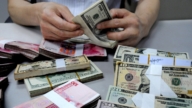【新唐人2013年07月13日讯】今年上半年,中国大陆306个城市的土地交易,同比大幅增长60%。有的大城市半年之内卖地的数量,接近去年全年的水平,还有的甚至比去年同期增长超过27倍。同时因为投资过热,接近倒闭的地方政府也在涌现。业内专家表示,中国局部经济危机正在悄然发生,随着财政收入增速下降、地方债务还债高峰来临,以及在“钱荒”背景下,卖地成为各地政府最现实,最快捷的财源。
据大陆财经媒体报导,全中国上半年306个城市共交易土地1万5493笔,入账人民币1.13万亿元,与去年同期相比大幅增加60%。其中,北京、上海、广州商业土地出让金额超过1739亿元,逼近去年全年总额。杭州同比涨幅最大,为410%,广州以368%的同比涨幅位居第二。
另外,报导说,内蒙古有“鬼城”之称的鄂尔多斯市,负债高达2000亿到4000亿,地方当局不得不向企业施压,借款15亿来发放公务员工资。据上海《新民周刊》分析,如果允许破产,至少有16个地方政府濒临倒闭。
美国资深经济分析师、经济学家简天伦:“地方政府越来越依靠卖地来作为财政收入,而现在经济不好的情况下,收税各方面收入减少,它也希望卖更多的地,价钱是由政府说了算,而且每年卖多少地也是由他们在控制。”
过去,买地的主要是私人企业,近年来,石油、电力等拥有巨额财富的国营企业,也加入买地行列,导致地价不断攀升,同时带动房产泡沫越吹越大。美国资深经济分析师简天伦认为,这也是钱荒的一个原因,因为很多企业都把盈利投资于地产,而中国的地价上涨和房地产泡沫都是“国进民退”政策造成的。
简天伦:“产能过剩,放贷可能出现收不回来,地方债大约有1/3用于还旧债,这跟钱荒都有关系,这么多年出口、投资两个主要的龙头,投资现在减少了,出口在下降,所以经济前景肯定不好。”
“瑞银财富管理”亚太区首席投资总监认为,中国大陆经济放缓加上信贷紧张,中央希望市场自我调节,没有推出经济刺激政策的迹象,估计下半年内地部分行业将明显出现破产潮,当中也许涉及国企。
北京天则经济研究所副所长冯兴元:“有些人说今年都可能出现危机,但是一般说这种话,都是有一个假设前提,就是政府不调整政策,目前有三大可能的危机,一个是房地产,房地产会不会崩盘,第二个是地方政府负债,会不会出现比这更 大的债务危机,第三个是政局方面,这个就更无法预料。”
北京“天则经济研究所”副所长冯兴元还指出, 局部危机已经在发生,东部的制造业危机已经存在,地方政府违约现象也不少,出口保持负增加,在印发了相对GDP200%的钞票后,还出现钱荒已经很说明问题。
目前,重庆特钢厂,西安钢铁厂,湖北丹江钢厂,江西萍特钢铁有限公司等,大量钢铁生产企业因产能过剩、资金链断裂或贪污腐败等原因而破产。
冯兴元:“现在的情况,地方跟中央财政负债加起来已经很高了, 我个人比较保守的估计,加起来有(GDP的)86%,很多人估计得更高,这里跟别的国家不一样,我们的财政,没有钢性的制度来约束地方政府的负债,地方领导人,他没有偿债的责任,他只要升迁或调走了, 是下一轮政府 的事情,而且负债也没有真正有地方公民说了算,地方的人大也是空架子。”
冯兴元说,地方人大只是形式上为党政部门作出的决定,提供合法手续的一个装置。
大陆“海通证券”副总裁李迅雷日前表示,中国经济亟需“国退民进”。一旦房地产价格下跌,将对银行和地方政府财政收入造成巨大冲击。
交通、建材、原材料等行业,曾在四万亿刺激下飞速发展,但财政部公布的数据显示,这些行业已出现同比利润大幅下滑。李迅雷指出,大型国有企业维持“大而不倒”,未来将涌现更多问题,大型企业出现的亏损,也将直接导致银行坏账率不断攀升。
采访编辑/刘惠 后制/周天
Money Shortage And Huge Debts Force China’s Local
Governments To Sell More Land
In the first half of 2013, the number of land sales in
306 cities in Mainland China sharply increased by 60%.
The number has almost reached that of all 2012 sales
in some big cities, or even 27 times some areas in 2012.
At the same time, some local governments have been close
to bankruptcy due to overinvestment.
Financial experts believe that, the local economic crisis
is silently arriving in China.
As the slowdown in revenue growth becomes sharper,
the peak time for local governments to pay their debts is coming. Chinese banks are short of cash.
Land sales have become the most realistic and
quickest way to get money for local governments.
According to Chinese financial media, in the
first half of 2013 there were 15,493 land deals completed in 306 Chinese cities.
The total value of sales is 1.13 trillion Yuan,
60% more than during the same period last year.
In Beijing, Shanghai and Guangzhou, the sum of financial
land trades was over 173.9 billion Yuan.
This almost reached the level of the whole of last year.
Hangzhou has the biggest increase of 410% in land sales,
and Guangzhou ranks second with an increase of 368%.
Another report revealed the city of Ordos
in Inner Mongolia,
known as “the biggest ghost town in China”,
is in huge debt of 200 to 400 billion Yuan.
The authority has forcibly borrowed 1.5 billion from local
businesses to pay the salary of governmental employees.
Shanghai ‘s Xinmin Weekly estimated at least 16 local
governments are on the brink of bankruptcy.
Jian Tianlun (Senior economic analyst, USA):
Local governments are more dependent on land sales as a resource of revenue.
As bad economy leads to a drop in tax revenues,
governments are willing to sell more lands.
After all they have a complete control over the price
of land and how much land they can sell per year.”
In the past, land sellers were mostly private enterprises.
However, extremely wealthy state-owned companies
in the oil or electric power industry have recently joined this group.
This has resulted in surge of land value and inflation
of a “housing bubble”.
Jian Tianlun believes that this is also a cause of
China ‘s money shortage as many companies invested their profits in property.
Also both the surge of land value and the
real estate bubble are results of the policy of “enriching the state prior to its people”.
Jian Tianlun: ”When there are excess capacity issues,
lenders may not be able to get their money back.
About one-third of local debts are used to pay off old debts,
and this directly relates to the money shortage.
All these years export and investment have been two
major driving forces of China ‘s economic growth.
Now that both of them display a downward trend,
the economic outlook is definitely not optimistic.”
APAC Regional Chief Investment Officer at
UBS Wealth Management, Pu Yonghao believes
there is no sign of any future economic stimulus
from the central authority under slowdown
of China ‘s economic growth and the credit squeeze.
Probably the Chinese Communist Party (CCP) wants
the market to undergo some self-regulation.
Pu speculates a bankruptcy boom in some industries
in the second half of 2013, possibly involving state-owned companies.
Feng Xingyuan, deputy director of Beijing Tianze Institute
of Economics: ”When some says that the crisis will come
this year, this has to be based on the assumption that
the government won ‘t change the current economic policy.
Three possible crises may break out. The first one
is whether the real estate market will collapse.
The second is whether the debts of local government
will result in a large-scale debt crisis.
The third is about changes in the political situation,
which is the most difficult to predict.”
Feng Xingyun further commented that local crises
have been taking place in China.
For example, the manufacturing industry crisis in
the East is already there,
many local governments have breached contracts.
Exports have been constantly dropping.
The problem is very serious as the money shortage
still broke out even after the CCP printed money of 200% of China ‘s GDP.
Now many Chinese iron and steel enterprises
e.g. Chongqing Special Steel Factory, Xi ‘an Iron and Steel factory,
Hubei Danjiang Steel factory and
Jiangxi Pingte Iron and Steel Co. Ltd, have been bankrupted.
This is due to excess capacity, breakdown in the
financial chain or corruption.
Feng Xingyuan: Currently the debts of China’s local and
central governments have reached a very high level.
According to my conservative estimate,
the debts total 86% of China’s GDP.
Many people have made even higher estimates.
Here China is different from other countries.
There is no formality in regulating the debt limit
of local governments.
Local leaders are not responsible for paying back the debts.
As long as the leader is promoted or transferred elsewhere,
all the troubles are left to his successor.
Local citizens have no power in this issue.
The local People’s Congress is also simply an ornament.”
Feng said that the local People’s Congress only serves
to pass the party’s decision on procedure.
It is a tool of legitimizing whatever the Party wants to do.
Vice executive of China ‘s Haitong Securities,
Li Xunlei recently said China urgently needs to “enrich its people before the CCP”.
However, once the price of properties drop, there will be
a huge impact on banks and revenue of local governments.
The CCP’s 4-trillion stimulus package once induced
rapid development of industries through transportation, building materials and raw materials.
However, latest official financial statistics show a
significant drop of benefit rate in these industries.
Li Xunlei commented that, more problems will emerge
as huge state-owned companies continue to struggle.
The deficits they generate will directly result in
surging bad debts of Chinese banks.


























